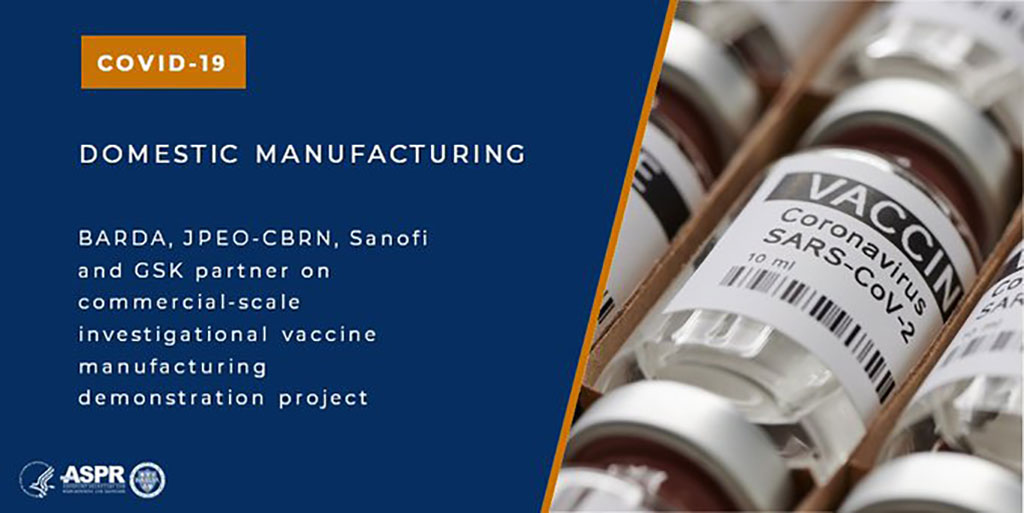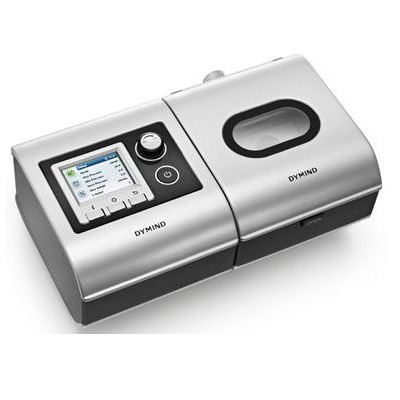GSK and Sanofi Collaborate with US Government for Development of COVID-19 Recombinant Protein-Based Vaccine
|
By HospiMedica International staff writers Posted on 03 Aug 2020 |

Illustration
GlaxoSmithKline plc (London, UK) and Sanofi S.A. (Paris, France) will collaborate with the US government to accelerate the development and manufacturing of a COVID-19 recombinant protein-based vaccine.
The vaccine candidate, developed by Sanofi in partnership with GSK, is based on the recombinant protein technology used by Sanofi to produce an influenza vaccine, and GSK’s established pandemic adjuvant technology. Sanofi is leading the clinical development and registration of the COVID-19 vaccine and expects a Phase 1/ 2 study to start in September, followed by a Phase 3 study by the end of 2020. If data are positive, the companies can request US regulatory approval in the first half of 2021. In parallel, Sanofi and GSK are scaling up manufacturing of the antigen and adjuvant to produce up to one billion doses per year globally.
Collaborating with the US Department of Health and Human Services (HHS) and Department of Defense will help fund the development activities and secure scale-up of Sanofi’s and GSK’s manufacturing capabilities in the US for the recombinant protein-based, adjuvanted vaccine, resulting in a significant increase in capacity. The US government will provide up to USD 2.1 billion, more than half of which is to support further development of the vaccine, including clinical trials, with the remainder used for manufacturing scale up and delivery of an initial 100 million doses of the vaccine. Sanofi will receive the majority of the US government funding. The US government has a further option for the supply of an additional 500 million doses longer term. This helps the US government’s Operation Warp Speed goals of providing millions of doses of a safe and effective COVID-19 vaccine.
“The global need for a vaccine to help prevent COVID-19 is massive, and no single vaccine or company will be able to meet the global demand alone,” said Thomas Triomphe, Executive Vice President and Global Head of Sanofi Pasteur. “From the beginning of the pandemic, Sanofi has leveraged its deep scientific expertise and resources to help address this crisis, collaborating with the U.S. Department of Health and Human Services to unlock a rapid path toward developing a pandemic vaccine and manufacturing at large scale. With our partner GSK, we expect our Phase 1/2 study for the recombinant adjuvanted approach to start in September.”
“GSK is proud to be working in partnership with Sanofi to make this vaccine available at scale as soon as possible. We thank the U.S. government for playing a very important role in providing early, significant funding to enable the development and scale-up of this potentially important vaccine,” added Roger Connor, President of GSK Vaccines.
Separately, Sanofi and GSK are in advanced discussions with the European Commission (EC) for the supply of up to 300 million doses of their COVID-19 vaccine. The doses would be manufactured in European countries, including France, Belgium, Germany and Italy.
“Today’s announcement helps to ensure that millions of Europeans will have access to a potential vaccine protecting against COVID-19, once proven safe and effective. It has been our steadfast commitment to provide a vaccine that is affordable and accessible to everyone, and we are grateful to the European Commission for their ongoing engagement and shared support of this effort,” said Triomphe. “Together with GSK, we are working relentlessly to develop and produce a vaccine to address this global health crisis.”
“GSK is proud to be working in partnership with Sanofi to make this vaccine available as soon as possible in Europe. Both companies have significant R&D and manufacturing capability in Europe and are already working hard to scale up production across our networks. This announcement from the EC supports our ongoing efforts,” added Connor.
Related Links:
GlaxoSmithKline plc
Sanofi S.A.
The vaccine candidate, developed by Sanofi in partnership with GSK, is based on the recombinant protein technology used by Sanofi to produce an influenza vaccine, and GSK’s established pandemic adjuvant technology. Sanofi is leading the clinical development and registration of the COVID-19 vaccine and expects a Phase 1/ 2 study to start in September, followed by a Phase 3 study by the end of 2020. If data are positive, the companies can request US regulatory approval in the first half of 2021. In parallel, Sanofi and GSK are scaling up manufacturing of the antigen and adjuvant to produce up to one billion doses per year globally.
Collaborating with the US Department of Health and Human Services (HHS) and Department of Defense will help fund the development activities and secure scale-up of Sanofi’s and GSK’s manufacturing capabilities in the US for the recombinant protein-based, adjuvanted vaccine, resulting in a significant increase in capacity. The US government will provide up to USD 2.1 billion, more than half of which is to support further development of the vaccine, including clinical trials, with the remainder used for manufacturing scale up and delivery of an initial 100 million doses of the vaccine. Sanofi will receive the majority of the US government funding. The US government has a further option for the supply of an additional 500 million doses longer term. This helps the US government’s Operation Warp Speed goals of providing millions of doses of a safe and effective COVID-19 vaccine.
“The global need for a vaccine to help prevent COVID-19 is massive, and no single vaccine or company will be able to meet the global demand alone,” said Thomas Triomphe, Executive Vice President and Global Head of Sanofi Pasteur. “From the beginning of the pandemic, Sanofi has leveraged its deep scientific expertise and resources to help address this crisis, collaborating with the U.S. Department of Health and Human Services to unlock a rapid path toward developing a pandemic vaccine and manufacturing at large scale. With our partner GSK, we expect our Phase 1/2 study for the recombinant adjuvanted approach to start in September.”
“GSK is proud to be working in partnership with Sanofi to make this vaccine available at scale as soon as possible. We thank the U.S. government for playing a very important role in providing early, significant funding to enable the development and scale-up of this potentially important vaccine,” added Roger Connor, President of GSK Vaccines.
Separately, Sanofi and GSK are in advanced discussions with the European Commission (EC) for the supply of up to 300 million doses of their COVID-19 vaccine. The doses would be manufactured in European countries, including France, Belgium, Germany and Italy.
“Today’s announcement helps to ensure that millions of Europeans will have access to a potential vaccine protecting against COVID-19, once proven safe and effective. It has been our steadfast commitment to provide a vaccine that is affordable and accessible to everyone, and we are grateful to the European Commission for their ongoing engagement and shared support of this effort,” said Triomphe. “Together with GSK, we are working relentlessly to develop and produce a vaccine to address this global health crisis.”
“GSK is proud to be working in partnership with Sanofi to make this vaccine available as soon as possible in Europe. Both companies have significant R&D and manufacturing capability in Europe and are already working hard to scale up production across our networks. This announcement from the EC supports our ongoing efforts,” added Connor.
Related Links:
GlaxoSmithKline plc
Sanofi S.A.
Latest COVID-19 News
- Low-Cost System Detects SARS-CoV-2 Virus in Hospital Air Using High-Tech Bubbles
- World's First Inhalable COVID-19 Vaccine Approved in China
- COVID-19 Vaccine Patch Fights SARS-CoV-2 Variants Better than Needles
- Blood Viscosity Testing Can Predict Risk of Death in Hospitalized COVID-19 Patients
- ‘Covid Computer’ Uses AI to Detect COVID-19 from Chest CT Scans
- MRI Lung-Imaging Technique Shows Cause of Long-COVID Symptoms
- Chest CT Scans of COVID-19 Patients Could Help Distinguish Between SARS-CoV-2 Variants
- Specialized MRI Detects Lung Abnormalities in Non-Hospitalized Long COVID Patients
- AI Algorithm Identifies Hospitalized Patients at Highest Risk of Dying From COVID-19
- Sweat Sensor Detects Key Biomarkers That Provide Early Warning of COVID-19 and Flu
- Study Assesses Impact of COVID-19 on Ventilation/Perfusion Scintigraphy
- CT Imaging Study Finds Vaccination Reduces Risk of COVID-19 Associated Pulmonary Embolism
- Third Day in Hospital a ‘Tipping Point’ in Severity of COVID-19 Pneumonia
- Longer Interval Between COVID-19 Vaccines Generates Up to Nine Times as Many Antibodies
- AI Model for Monitoring COVID-19 Predicts Mortality Within First 30 Days of Admission
- AI Predicts COVID Prognosis at Near-Expert Level Based Off CT Scans
Channels
Critical Care
view channel
Light-Based Technology to Measure Brain Blood Flow Could Diagnose Stroke and TBI
Monitoring blood flow in the brain is crucial for diagnosing and treating neurological conditions such as stroke, traumatic brain injury (TBI), and vascular dementia. However, current imaging methods like... Read more
AI Heart Attack Risk Assessment Tool Outperforms Existing Methods
For decades, doctors have relied on standardized scoring systems to assess patients with the most common type of heart attack—non-ST-elevation acute coronary syndrome (NSTE-ACS). The GRACE score, used... Read moreSurgical Techniques
view channel
Minimally Invasive Endoscopic Surgery Improves Severe Stroke Outcomes
Intracerebral hemorrhage, a type of stroke caused by bleeding deep within the brain, remains one of the most challenging neurological emergencies to treat. Accounting for about 15% of all strokes, it carries... Read more
Novel Glue Prevents Complications After Breast Cancer Surgery
Seroma and prolonged lymphorrhea are among the most common complications following axillary lymphadenectomy in breast cancer patients. These postoperative issues can delay recovery and postpone the start... Read morePatient Care
view channel
Revolutionary Automatic IV-Line Flushing Device to Enhance Infusion Care
More than 80% of in-hospital patients receive intravenous (IV) therapy. Every dose of IV medicine delivered in a small volume (<250 mL) infusion bag should be followed by subsequent flushing to ensure... Read more
VR Training Tool Combats Contamination of Portable Medical Equipment
Healthcare-associated infections (HAIs) impact one in every 31 patients, cause nearly 100,000 deaths each year, and cost USD 28.4 billion in direct medical expenses. Notably, up to 75% of these infections... Read more
Portable Biosensor Platform to Reduce Hospital-Acquired Infections
Approximately 4 million patients in the European Union acquire healthcare-associated infections (HAIs) or nosocomial infections each year, with around 37,000 deaths directly resulting from these infections,... Read moreFirst-Of-Its-Kind Portable Germicidal Light Technology Disinfects High-Touch Clinical Surfaces in Seconds
Reducing healthcare-acquired infections (HAIs) remains a pressing issue within global healthcare systems. In the United States alone, 1.7 million patients contract HAIs annually, leading to approximately... Read moreHealth IT
view channel
Printable Molecule-Selective Nanoparticles Enable Mass Production of Wearable Biosensors
The future of medicine is likely to focus on the personalization of healthcare—understanding exactly what an individual requires and delivering the appropriate combination of nutrients, metabolites, and... Read moreBusiness
view channel
Philips and Masimo Partner to Advance Patient Monitoring Measurement Technologies
Royal Philips (Amsterdam, Netherlands) and Masimo (Irvine, California, USA) have renewed their multi-year strategic collaboration, combining Philips’ expertise in patient monitoring with Masimo’s noninvasive... Read more
B. Braun Acquires Digital Microsurgery Company True Digital Surgery
The high-end microsurgery market in neurosurgery, spine, and ENT is undergoing a significant transformation. Traditional analog microscopes are giving way to digital exoscopes, which provide improved visualization,... Read more
CMEF 2025 to Promote Holistic and High-Quality Development of Medical and Health Industry
The 92nd China International Medical Equipment Fair (CMEF 2025) Autumn Exhibition is scheduled to be held from September 26 to 29 at the China Import and Export Fair Complex (Canton Fair Complex) in Guangzhou.... Read more










.jpg)






